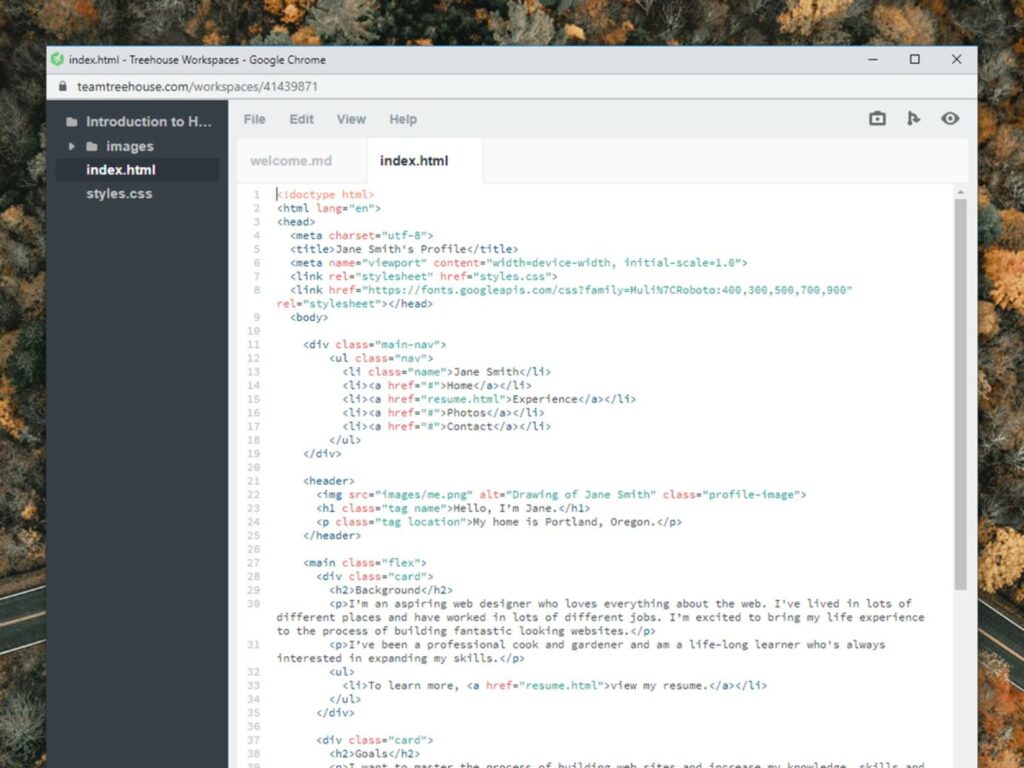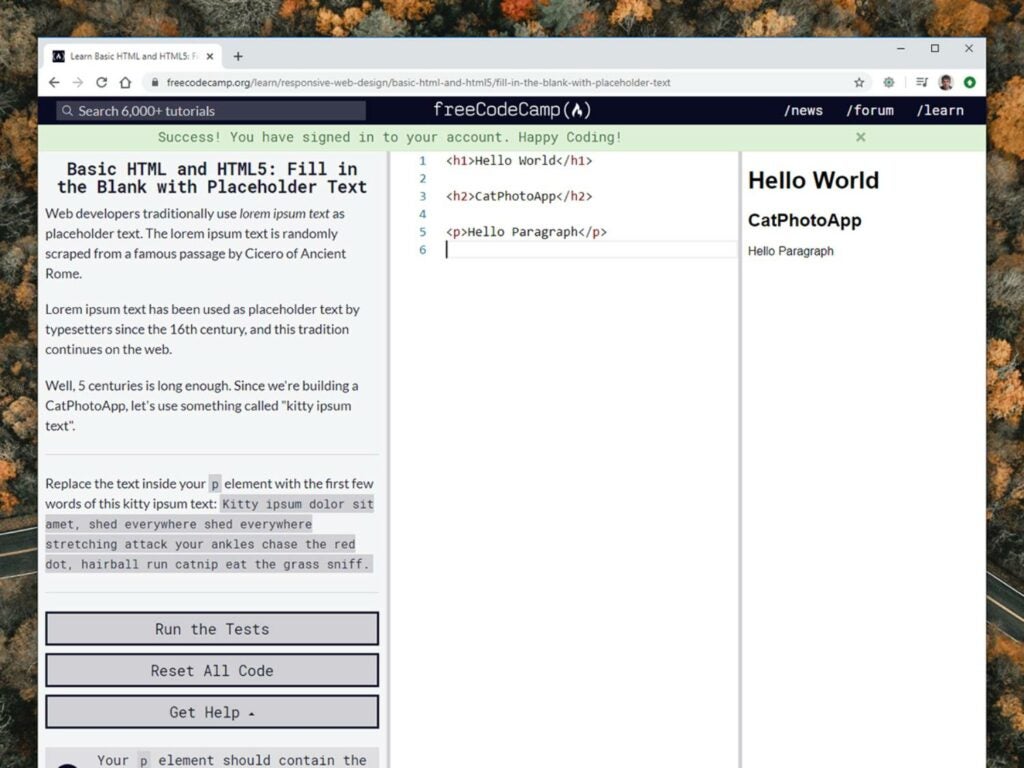Open Source Proctoring Software is an online assessment platform that allows you to take exams or assessments, serve assessments to your users or students, and get instant results. As a proctor our software allows you to see if the test-takers are cheating by trying to change their answers after they have been submitted.
We also block out all other programs on their computers so they can’t take a screenshot of their work and send it back to themselves so they can look at it later while they are answering the questions. Here are the best platforms out there!
Treehouse

Treehouse is based largely around videos and programming exercises, and although its entry point is still accessible enough for beginners, the platform is aimed at people who are seriously thinking about a career in coding. You’ll get a 7-day free trial but after that, lessons start at $25 a month, so Treehouse is not the best idea if you just want to play around with a few basics.
Users go through a very clear progression of tutorials and exercises, with a neat sandbox feature called Workspaces, where you can try out experiments of your own. The platform may come across as too formal or too heavy for some (the free trial will help you work this out), but it’s a comprehensive learn-to-code package that covers HTML, CSS, JavaScript, Python, PHP, and more.
Treehouse can teach you how to code for iOS and Android, but ironically, courses are only available through your web browser on a computer.
Treehouse (from $25 a month) on the web.
Udemy
While Udemy may seem a bit chaotic and has pricing varies a lot, it’s still one of the best online resources for someone looking to learn to code. It goes from the basics all the way to the most complex programming concepts, and in that sense is on a par with platforms such as Treehouse.
If you’re unfamiliar with the portal, you should know that Udemy works as a sort of online marketplace, in which anyone can create a course. This means teaching styles differ quite a bit—this is great if you find a teacher you connect with, but problematic if you don’t. Content quality can also differ, but most of the material on this platform is top notch.
Udemy courses cover a whole range of topics, but as far as coding goes you’ve got everything from web and mobile development, to artificial intelligence. There’s a really big stack of stuff to go through. Unlike other platforms on this list, teachers on Udemy present tutorials in video form and offer answers to any questions you might have. Having a person on the other end—even if it’s not a one-on-one learning scenario—requires a fair degree of concentration and commitment so you should consider that when signing up for a Udemy class.
And since there’s no free trial—just a preview option and a 30-day money back guarantee—you should definitely check out reviews and comments from past users before you sign up for a class.
Udemy (from $10 and up per course) is available on Android and iOS, and on the web.
Dash
Dash offers shorter courses than other platforms on this list, and has a relatively narrow focus, concentrating on HTML, CSS, and JavaScript for web development. But that’s not necessarily a disadvantage if you’re looking for a brief overview of the fundamentals of these specific coding languages.
The Dash interface certainly impresses, with a coding window on one side and a nice big preview of your finished webpage on the other. It has five well laid out and easy to follow projects, including a responsive blog, a small business website or even a browser game that looks great on desktop or mobile. On each one, you can see instantly how your code affects the live site, making learning much more interactive.
It’s very much an ‘on rails’ experience—you won’t be able to build any website or browser game you like without more learning, but it’s a fine introduction to the basics.
Dash (free) is available on the web.
FreeCodeCamp

FreeCodeCamp is a huge collection of more than 6,000 tutorials and, as the name suggests, they’re all completely free to use. They cover HTML, CSS, JavaScript, Python, React, Java, SQL, and several other coding languages, and if you need help at any point, then there are some busy forums packed with pointers and advice.
There are some drawbacks, though. FreeCodeCamp isn’t quite as polished in terms of the interface and the course structure as some of the other entries on our list, and you don’t get as much hand-holding. Also, the platform doesn’t offer mobile apps either, so it’s all done through your browser on a computer.
Still, these are all minor details in our opinion, and not at all deal breakers when it comes to choosing a code-teaching platform. FreeCodeCamp is still very comprehensive, available for free, and easy enough at the beginning for anyone to pick up.
FreeCodeCamp (free) is available on the web.
BitDegree

BitDegree is a great place to learn to code for free. This online learning platform has courses on various programming languages, including HTML, CSS, JavaScript, PHP, jQuery, and Ruby on Rails.
Moreover, there are coding classes for subjects like game development and data science. Some even come with certifications, which can be helpful when looking for a new job.
To get started, simply sign up with an email address and password, and pick one of the available free courses.
Generally, there are two types of online courses to choose from. The first is designed by BitDegree itself and usually comes in an interactive format. There will be a screen with a code editor, allowing students to test the scripts right away.
The other type is composed of standard video lessons developed by experts in the industry. Some may include quizzes, open-ended questions, or exercises to create a more engaging learning experience.
What’s excellent about BitDegree is that it uses a token system to reward students every time they complete a session. They can use these tokens to get a discount for paid coding classes or fund upcoming courses in the Community Votes section.
Other than that, students can check out the Code Playground page to submit their work or check others’ for inspiration.
Learn to code by reading the following guides
What Is JavaScript
What Is jQuery
HTML Cheat Sheet
CSS Cheat Sheet
Codecademy

Codecademy is one of the best sites to learn coding. Like BitDegree, it offers free and paid courses on a wide range of programming subjects. Students can choose their class based on the language they want to master or their desired career path.
If you’re unsure where to begin, Codecademy has a sorting quiz to determine what programming job is best for you and which course to start with.
The free coding classes mainly cover introductory lessons, though there are several intermediate ones as well.
Besides essentials like HTML and CSS, Codecademy also features specific programming languages, such as Go and Swift. These are used to make Google and Apple applications, respectively.
The learning experience is quite hands-on. Each course features a set of explanations and instructions, along with a code editor for students to practice their knowledge.
Should you get stuck on the instructions, use the hint provided. The community forums are also accessible within the lesson if you need more information.
Note that Codecademy doesn’t offer certificates for its free courses as BitDegree does. To get them, consider purchasing the Pro plan, which costs $19.99/month. College students can enjoy a 35% discount.
Coursera

Coursera is a leading online learning platform. Partnering with top universities and companies, it offers high-quality courses for in-demand skills – including programming.
The subject library is vast, starting from computer science, web development, data analytics to machine learning.
Many of the classes are free, but you will have to pay around $39 or more to get a certificate and complete specific tasks. The paid courses, on the other hand, usually come with a 7-day free trial.
When signing up, Coursera will have you insert some personal information so that they can tailor the course recommendations to your taste.
The learning process generally uses a mix of video content, reading materials, exercises, quizzes, and participant forums. Students can also set a weekly learning goal to stay motivated.
If you want to learn how to code a website, check out this Introduction to Web Development course from UC Davis. It will explain the basics of how websites work and how to use HTML, CSS, and Javascript.
edX

Next on the list is edX. It’s a nonprofit that works with world-class universities, like Harvard and NYU, to provide 3,000+ free online courses.
Like Coursera, the lessons are freely accessible, but getting a certificate and doing tasks for grading requires purchasing the course. The cost is between $50 and $300.
The free coding classes are mostly available in the Computer Science category.
There are introductory coding lessons on languages like HTML, JavaScript, SQL, C, C++, and Python. Alternatively, pick subject-specific programming courses, such as website building, mobile app development, data structures, or software engineering.
Aside from videos, the courses usually include readings, exercises, and forums to make the learning experience more interactive. Students who enroll in the free track will have access to these materials until the specified expiration date.
Khan Academy

Another non-profit company, Khan Academy, offers excellent beginner-friendly resources to learn to code for free.
The topics are mainly basic computer programming principles, HTML, CSS, JavaScript, jQuery, and SQL. While the collection isn’t as vast as in other platforms, it is sufficient for novice web developers.
Other than that, Khan Academy also has a short and interactive program called Hour of Code. There, students can practice coding for animation, building websites, or managing data.
The primary teaching media consists of videos, flashcards, and practices using a code editor. When the instructor has finished explaining, the participant can practice their newfound knowledge by completing the challenges in the section.
Conclusion
Coding Assessment Platform is the free online proctoring software and platforms for on-demand assessments, exams, and exams results analytics. It provides web-based platform to completely automate the exam process on the web, on any devices.
